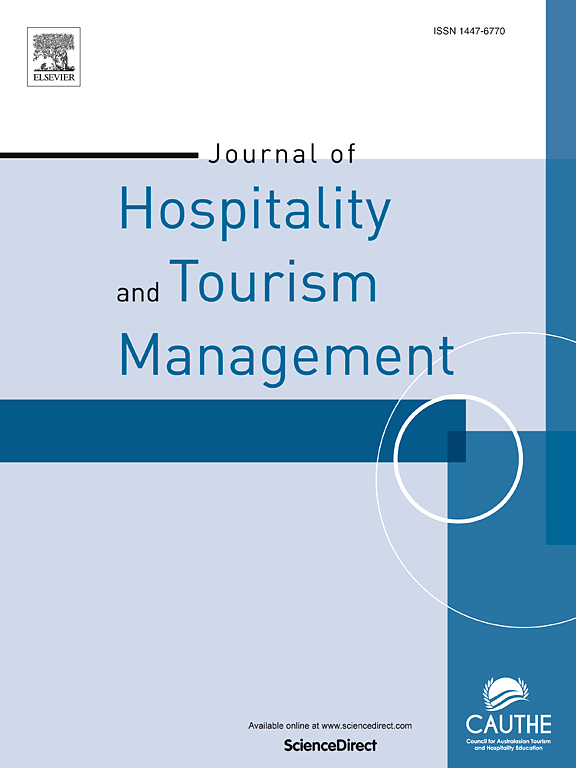配偶心理弹性对一线酒店员工工作投入的影响:双情境偶然性
IF 7.8
1区 管理学
Q1 HOSPITALITY, LEISURE, SPORT & TOURISM
引用次数: 0
摘要
由于工作轮班和高工作要求,弹性的话题越来越受到酒店领域的关注。尽管相当多的研究强调了心理弹性的个人影响,但关于心理弹性潜在的人际、跨领域影响的知识有限。根据交叉理论,我们开发了一个模型,该模型指定配偶弹性是否以及何时有助于一线酒店员工的工作成果。我们使用二元经验抽样数据来检验我们的假设,这些数据是在连续七个工作日内从134名一线酒店员工及其配偶中收集的。结果证实,配偶弹性与一线酒店员工第二天早上工作投入的增加有关。配偶的心理疏离(一个个人因素)和配偶的工作-家庭人际资本化(一个行为因素)调节了我们观察到的影响。具体而言,高心理超然或高工作-家庭人际资本化的配偶可以加强所提出的积极传递。通过关注配偶心理弹性与一线酒店员工工作敬业度的交叉,我们的研究有助于对心理弹性的人际效应的持续讨论。本文章由计算机程序翻译,如有差异,请以英文原文为准。
Benefits of spouse resilience on frontline hospitality employee work engagement: dual situational contingencies
Due to the work shift and high job demands, the topic of resilience has attracted increasing attention in the field of hospitality. Despite considerable research has highlighted the intrapersonal effects of resilience, knowledge about potential interpersonal, cross-domain effects of resilience is limited. Drawing upon crossover theory, we develop a model that specifies whether and when spouse resilience contributes to frontline hospitality employee work outcomes. We test our hypotheses using dyadic experience-sampling data, collected from 134 frontline hospitality employees and their spouses across seven consecutive workdays. Results confirmed that spouse resilience was associated with increased frontline hospitality employee next-morning work engagement. Spouses’ psychological detachment––a personal factor––and spouses’ work–family interpersonal capitalization––a behavioral factor moderated our observed effects. Specifically, spouse with high psychological detachment or high work–family interpersonal capitalization can strengthen the proposed positive transmissions. By focusing on the crossover of spouse resilience onto frontline hospitality employee work engagement, our study contributes to the ongoing discussions on the interpersonal effects of resilience.
求助全文
通过发布文献求助,成功后即可免费获取论文全文。
去求助
来源期刊
CiteScore
13.30
自引率
8.40%
发文量
177
审稿时长
45 days
期刊介绍:
Journal Name: Journal of Hospitality and Tourism Management
Affiliation: Official journal of CAUTHE (Council for Australasian Tourism and Hospitality Education Inc.)
Scope:
Broad range of topics including:
Tourism and travel management
Leisure and recreation studies
Emerging field of event management
Content:
Contains both theoretical and applied research papers
Encourages submission of results of collaborative research between academia and industry.

 求助内容:
求助内容: 应助结果提醒方式:
应助结果提醒方式:


